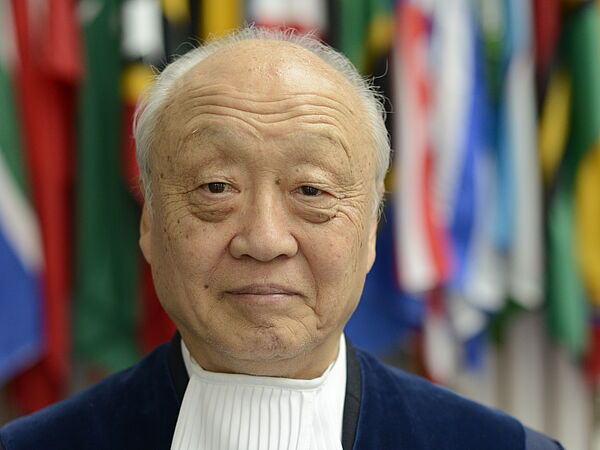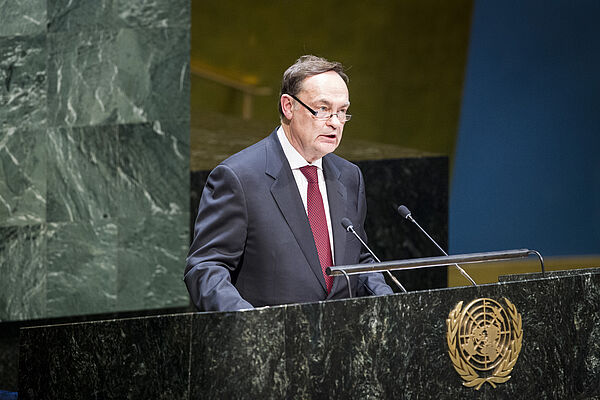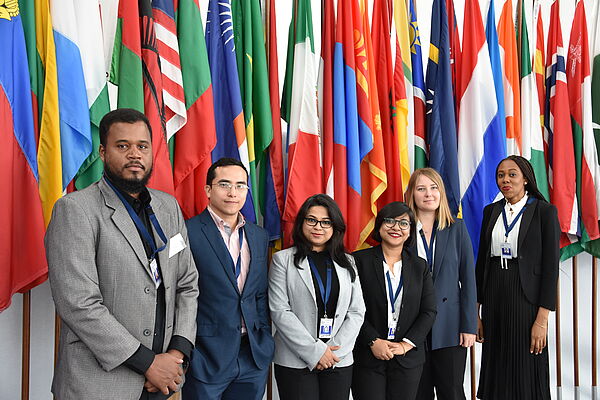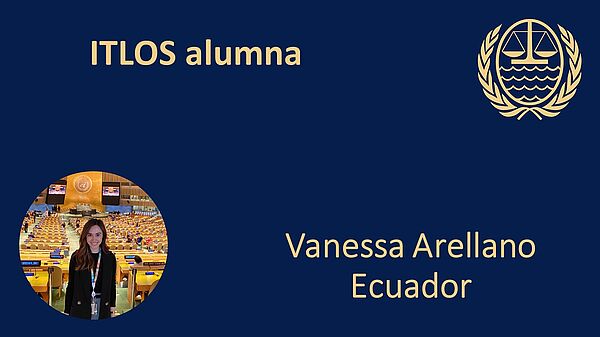Newsletter 2023/1
April 2023
Introduction
The first ITLOS newsletter for 2023 comes at a time where the importance and, indeed, success of ocean-related international negotiations have taken centre stage. Last month saw the successful conclusion of negotiations on a landmark agreement, under the United Nations Convention on the Law of the Sea, on the conservation and sustainable use of marine biological diversity of areas beyond national jurisdiction. This is truly a major achievement for the protection and preservation of our oceans. I am pleased to see that States continue to place their trust in the Tribunal, created by the Convention, as the central judicial organ in these matters, and the value they attach to its role in facilitating the peaceful settlement of international disputes, as provided for under this new agreement. I am equally satisfied to note that the Tribunal’s advisory jurisdiction may be invoked by the Conference of the Parties.
Since the publication of the previous newsletter, a number of developments have taken place in the judicial work of the Tribunal. In October 2022, the oral hearings in Case No. 28 were concluded, and the Special Chamber formed to deal with the Dispute concerning delimitation of the maritime boundary between Mauritius and Maldives in the Indian Ocean (Mauritius/Maldives) will deliver its judgment on 28 April 2023. In December, the Tribunal received a Request for an Advisory Opinion submitted by the Commission of Small Island States on Climate Change and International Law (Request for Advisory Opinion submitted to the Tribunal). States Parties, the Commission of Small Island States on Climate Change and International Law and selected organizations have been invited to present written statements, by 16 June 2023, on the questions submitted to the Tribunal. The request for an advisory opinion comes at a time when recognition of the importance of the ocean-climate nexus is increasing and the need for States to respond to the climate emergency is becoming more apparent. This can be seen not only in the request received by the Tribunal, but also in the requests for climate-change related advisory opinions submitted to both the International Court of Justice and the Inter-American Court of Human Rights.
In other Tribunal-related matters, the election of seven members of the Tribunal will be held at the upcoming Meeting of States Parties in June 2023. Information on the election procedure and the list of candidates nominated by States Parties are available on the Tribunal’s website here.
Before I close, allow me to express my gratitude to the Government of Germany for their vital work in completing the modernization of the Tribunal’s courtroom. The rotunda in the entrance hall has been restored and the courtroom is now fully operational, enabling the Tribunal to conduct proceedings with even greater efficiency than that on which it has built its reputation.
I hope that you enjoy reading the newsletter.
With my warmest regards,
Albert Hoffmann
President
ITLOS Cases
After a week of hearings in the interim courtroom, the oral proceedings in Case No. 28 concluded on 24 October 2022. An archive of webcasts, the verbatim records and a selection of photographs from the hearing are available on the case page.
The Special Chamber will deliver its judgment on 28 April 2023.
Case No. 30: The M/T “Heroic Idun” Case (Marshall Islands v. Equatorial Guinea), Prompt Release
By Order of 15 November 2022, the President of the Tribunal placed on record the discontinuance of the proceedings initiated on 10 November 2022 by the Marshall Islands against Equatorial Guinea and ordered the removal of the case from the Tribunal’s List of cases.
In accordance with the Order of the President of 15 February 2023, the time limit within which written statements may be presented to the Tribunal was extended to 16 June 2023.
Interview with Judge Shunji Yanai (Japan)

You are one of the Tribunal’s longest serving judges and have extensive experience in international law and international dispute settlement. What inspired you to become a judge, and what motivated you to specialize in the law of the sea?
I was born and raised in a maritime country surrounded by seas and the Pacific Ocean, and I have always been interested in everything related to the sea. After I joined the Ministry of Foreign Affairs of Japan, I served in various positions in its legal office, including that of Legal Advisor to the Foreign Affairs Minister. In these posts and also at the Permanent Mission of Japan to the United Nations, I was involved in many bilateral and multilateral negotiations involving international law matters, including fisheries and the continental shelf. When I was at the Permanent Mission to the United Nations, the Third United Nations Conference on the Law of the Sea started; I attended most of its sessions except for the last meeting in Caracas. In 2004, my predecessor Judge Yamamoto, renowned international law professor from Japan, advised me of his intention to leave ITLOS at the end of his nine-year term. I asked him, “Who will succeed you?” He answered, “You do it.” The Ministry of Foreign Affairs also asked me to run in the 2005 election at the Meeting of States Parties to UNCLOS. Thus, I became a judge.
You were the President of the Tribunal from 2011 to 2014. How is the role of the President different to that of other judges and what would you say were some of the challenges that you faced in your role as President?
In my view, the role of the President is fourfold: first and foremost, he or she administers the conduct of judicial work, including consultations with the parties to a dispute; second, the President manages the administration of the Registry, such as personnel and financial matters, in close cooperation with the Registrar; third, the President represents the Tribunal in the international community, including at the Meeting of States Parties to UNCLOS, the UN General Assembly, various meetings related to the law of the sea and with individual States; and fourth, the President has an incidental function under the Convention, which is to nominate arbitrators of Annex VII arbitral tribunals when either of the parties to a dispute does not nominate an arbitrator or the parties cannot reach an agreement on the nomination of the remaining three arbitrators within prescribed time limits. In carrying out these functions, the President faces many challenges. In particular, it is often difficult to conduct consultations with the litigating parties on the organization of written and oral proceedings; and at hearings, the President must decide on the spot whether to accept, reject or otherwise handle an objection raised by one party regarding the conduct of the other. The management of the Registry is not an easy task either, in particular regarding personnel matters, as opportunities for promotion of its staff members are limited in a small institution such as ours.
In your view, what are the important contributions the Tribunal can make to the peace and prosperity of the international community?
It goes without saying that the most important contribution of the Tribunal is the peaceful settlement of maritime disputes and the clarification of the rules of the law of the sea and international law through advisory opinions. To date, the Tribunal has delivered 25 judgments and orders, and given two advisory opinions. In addition, the Tribunal has contributed to the progressive development of the law of the sea through its jurisprudence. The following are some salient examples of such contribution: the application of “ship as a unit principle”; the first delimitation of the continental shelf beyond 200 nm in international adjudication; the clarification of the relationship between the “delineation” of the continental shelf beyond 200 nm by the CLCS and its “delimitation” by the Tribunal; a coastal State’s jurisdiction over bunkering by foreign vessels in its EEZ; the clarification by the Seabed Disputes Chamber of the responsibilities and obligations of sponsoring States with respect to activities in the Area; and the advisory opinion given by the full Tribunal on IUU fishing at the request of the Sub-Regional Fisheries Commission.
In Memoriam: Judge Vladimir Vladimirovich Golitsyn

It is with great sadness that we bid farewell to Judge Vladimir Golitsyn, who passed away on 26 March 2023. As a distinguished jurist, he left an indelible mark on the field of international law, in particular in the law of the sea, and his contributions will not be forgotten.
Judge Golitsyn served as President of the Tribunal from 2014 to 2017, and his leadership helped shape the Tribunal’s work and mission during his tenure. His intelligence, insight and unwavering commitment to the rule of law made him a respected and admired figure in his field. He made significant contributions to the development of the law of the sea, in particular in areas such as maritime boundary delimitation, the settlement of law of the sea disputes and in areas concerning the legal regime of the Arctic. Judge Golitsyn’s passing is a profound loss to the international legal community, and I have no doubt that his legacy will continue to inspire future generations of lawyers and law of the sea enthusiasts.
We extend our deepest condolences to Judge Golitsyn’s family, friends and colleagues, and we join them in mourning his sad passing.
Ximena Hinrichs Oyarce
ITLOS Conferences and Events

On 24 March 2023, ITLOS President, Albert Hoffmann, delivered a ceremonial address as the guest of honour at the 100th Ostasiatisches Liebesmahl, an annual event promoting relations between Germany and the Asia-Pacific region, held at the Hamburg City Hall.
Capacity Building
The Tribunal, in cooperation with the Université Côte d’Azur (Institut de la Paix et du Développement), will hold a regional workshop in Nice, France, on “The Role of the International Tribunal for the Law of the Sea in the Settlement of Disputes relating to the Law of the Sea”. The regional workshop will take place at the start of June 2023.
The second ITLOS Workshop for Legal Advisers (sponsored by the Republic of Korea) will take place at the premises of the Tribunal in July 2023. Organized for the legal advisers of Ministries of Foreign Affairs from African States, the week-long workshop will offer participants a series of lectures and discussion rounds with Judges, academics and practitioners.

ITLOS-Nippon capacity-building and training programme on dispute settlement under UNCLOS
After nine months of informative lectures and training, the six fellows of the ITLOS-Nippon capacity-building and training programme on dispute settlement under UNCLOS presented the results of their research to the Judges at the end of March. Their research topics covered the following subjects:
- “Prompt Release of Vessels and Crews: An Analysis of the ‘Reasonable Bond/Financial Security’ in Case of Marine Environmental Damage”;
- “Incidental Jurisdiction in Disputes under UNCLOS”;
- “Sustainability in Fisheries Subsidies Reform: A Perusal of the WTO Agreement on Fisheries Subsidies”;
- “Arrest, Detention and Release of Vessels under UNCLOS: A Perspective from the Gulf of Guinea”;
- “Les organisations régionales et sous-régionales des pêches en Afrique” ; and
- “The Grey Area in the Bay of Bengal: Current Legal Issues and Possible Cooperative Solutions between Bangladesh, India and Myanmar”.
The 17th edition of the programme is scheduled to start on 17 July 2023.

Internship programme
Since the last newsletter, interns from Azerbaijan, Benin, Brazil, Cameroon, China, Germany, Greece, Italy, Mexico, the Philippines and Singapore have participated in the internship programme in the Legal Office of the Tribunal.
Alumni network
The ITLOS alumni series of events continued with presentations on State action at sea with a focus on maritime environmental law; ship recycling; investment protection of submarine cables; the conservation and sustainable use of marine biological diversity of areas beyond national jurisdiction; and the 27th Conference of the Parties to the United Nations Framework Convention on Climate Change.
IFLOS Summer Academy
The next IFLOS Summer Academy is scheduled to take place from 30 July to 25 August 2023. Further information and the online application form are available on the website of the Foundation.
Meet the ITLOS Alumni

Ms Vanessa Arellano Rodríguez (Ecuador), Associate Legal Officer, United Nations Division for Ocean Affairs and the Law of the Sea, 2021-2022 ITLOS-Nippon fellow
Just over a year ago, my days as a Nippon fellow at the Tribunal were drawing to a close and I was hard at work preparing the research I would present to the Judges. Today, I write these lines from the Division of Ocean Affairs and the Law of the Sea (DOALOS) in New York, where I work as an associate legal officer.
Working at DOALOS and having the possibility to pursue a career in the law of the sea at the United Nations has been a long-held dream. My work at DOALOS focuses primarily on supporting the implementation of capacity-building programmes and training activities in partnership with the Nippon Foundation. Being on “the other side” allows me to contribute from my first-hand experience and to reflect daily on the importance of building capacity in ocean affairs and the law of the sea.
I always keep in mind the saying that “you never stop learning”. The law of the sea, and in particular the study of the Convention (broad as it is), always offers something new. Undoubtedly, my time at the Tribunal provided me with ample opportunity to learn and engage with both the work of the Tribunal and the ever-present importance of UNCLOS. The various lectures delivered by professionals of significant experience and expertise, including Judges and officials of the Tribunal, were of the highest quality. The sessions were enriched by the diversity of my fellow fellows and by the various conversations with lecturers outside the classroom.
As a 2021-2022 ITLOS-Nippon fellow, I was fortunate enough to witness the 25th anniversary celebrations of the Tribunal, and only a couple of months ago I was fortunate to witness the commemorations of the 40th anniversary of the adoption and opening for signature of the Convention. Witnessing these events from the premises of the Tribunal and today from the UN Headquarters has galvanized my professional development and has fuelled my passion for the field and my eagerness to continue learning. Importantly, it has reaffirmed my appreciation for the Convention, now and into the future. It has only been a few months since I became part of the network of the more than 500 ITLOS alumni, and I have already had the opportunity to meet several of them. The warmth with which we recognize each other is very special and speaks to the quality of the experience we had during our time at the Tribunal. I sincerely look forward to meeting and exchanging experiences and knowledge with the others!
Upcoming Events
The most recent administrative session of the Tribunal was held from 20 to 31 March 2023.
The Judgment in the Dispute concerning delimitation of the maritime boundary between Mauritius and Maldives in the Indian Ocean (Mauritius/Maldives) will be read on 28 April 2023.
A regional workshop on “The Role of the International Tribunal for the Law of the Sea in the Settlement of Disputes relating to the Law of the Sea” will be held on 1 and 2 June 2023 in France.
The second ITLOS Workshop for Legal Advisers (sponsored by the Republic of Korea) will be held from 2 to 7 July 2023.
The IFLOS Summer Academy will be held from 30 July to 25 August 2023.

